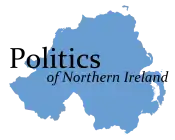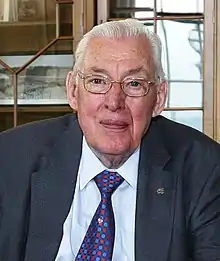1998 Northern Ireland Assembly election
The 1998 election to the Northern Ireland Assembly took place on Thursday, 25 June 1998. This was the first election to the new devolved Northern Ireland Assembly. Six members from each of Northern Ireland's eighteen Westminster Parliamentary constituencies were elected by single transferable vote, giving a total of 108 Members of the Legislative Assembly (MLAs).
| ||||||||||||||||||||||||||||||||||||||||||||||||||||||||||||||||||||||||||||||||||||||||||||||||||||||||||||||||||||||||||||||||||
All 108 seats to the Northern Ireland Assembly 55 seats needed for a majority | ||||||||||||||||||||||||||||||||||||||||||||||||||||||||||||||||||||||||||||||||||||||||||||||||||||||||||||||||||||||||||||||||||
|---|---|---|---|---|---|---|---|---|---|---|---|---|---|---|---|---|---|---|---|---|---|---|---|---|---|---|---|---|---|---|---|---|---|---|---|---|---|---|---|---|---|---|---|---|---|---|---|---|---|---|---|---|---|---|---|---|---|---|---|---|---|---|---|---|---|---|---|---|---|---|---|---|---|---|---|---|---|---|---|---|---|---|---|---|---|---|---|---|---|---|---|---|---|---|---|---|---|---|---|---|---|---|---|---|---|---|---|---|---|---|---|---|---|---|---|---|---|---|---|---|---|---|---|---|---|---|---|---|---|---|
| Turnout | 69.8% | |||||||||||||||||||||||||||||||||||||||||||||||||||||||||||||||||||||||||||||||||||||||||||||||||||||||||||||||||||||||||||||||||
| ||||||||||||||||||||||||||||||||||||||||||||||||||||||||||||||||||||||||||||||||||||||||||||||||||||||||||||||||||||||||||||||||||
 Seats won by each party per constituency. Voters elect 6 assembly members from the 18 constituencies. | ||||||||||||||||||||||||||||||||||||||||||||||||||||||||||||||||||||||||||||||||||||||||||||||||||||||||||||||||||||||||||||||||||
| ||||||||||||||||||||||||||||||||||||||||||||||||||||||||||||||||||||||||||||||||||||||||||||||||||||||||||||||||||||||||||||||||||
 |
|---|
| This article is part of a series on the politics and government of Northern Ireland |
Results
The result was (first preference votes only):[1]

| Party | Leader | Votes | % of vote | +/- | Seats | % of seats | +/- | |
|---|---|---|---|---|---|---|---|---|
| SDLP | John Hume | 177,963 | 22.0 | +0.6 | 24 | 22.2 | +3 | |
| UUP | David Trimble | 172,225 | 21.3 | -2.9 | 28 | 25.9 | -2 | |
| DUP | Ian Paisley | 145,917 | 18.0 | -0.8 | 20 | 18.5 | -4 | |
| Sinn Féin | Gerry Adams | 142,858 | 17.7 | +2.2 | 18 | 16.7 | +1 | |
| Alliance | John Alderdice | 52,636 | 6.5 | 0.0 | 6 | 5.6 | -1 | |
| UK Unionist | Robert McCartney | 36,541 | 4.5 | +0.8 | 5 | 4.6 | +2 | |
| Independent Unionist | 24,339 | 3.0 | N/A | 3 | 2.8 | +3 | ||
| PUP | Hugh Smyth | 20,634 | 2.6 | -1.0 | 2 | 1.9 | 0 | |
| NI Women's Coalition | Monica McWilliams | 13,019 | 1.6 | +0.6 | 2 | 1.9 | 0 | |
| Ulster Democratic | Gary McMichael | 8,651 | 1.1 | -1.1 | 0 | -2 | ||
| Independent | 5,392 | 0.7 | N/A | 0 | 0 | |||
| Labour Party NI | Malachi Curran | 2,729 | 0.3 | N/A | 0 | 0 | ||
| Workers' Party | Tom French | 1,989 | 0.3 | -0.3 | 0 | 0 | ||
| NI Conservatives | William Hague | 1,835 | 0.2 | -0.3 | 0 | 0 | ||
| Ulster Independence | Hugh Ross | 1,227 | 0.2 | -0.4 | 0 | 0 | ||
| Natural Law | James Anderson | 832 | 0.1 | 0.0 | 0 | 0 | ||
| Socialist Party | Joe Higgins | 789 | 0.1 | N/A | 0 | 0 | ||
| Green (NI) | 710 | 0.1 | -0.4 | 0 | 0 | |||
| Total | 108 | 100.0% | -2 | 786,132 | 100.0% | |||
All parties with over 500 votes listed. Electorate: 1,178,556; Turnout: 823,565 (69.88%); Spoiled votes: 13,248; Valid: 810,317.
Votes summary
Seats summary
Details
Although the SDLP won the most first preference votes, the Ulster Unionists won the most seats in the Assembly. This has been attributed to several reasons, including:
- Slightly different turnouts across the province, with the result that in the more staunchly unionist east fewer votes were required to elect an MLA than in the SDLP's heartlands in the west.
- The Ulster Unionists proved better at "vote balancing" whereby in the rounds of transfers their candidates were less likely to be eliminated earlier on.
- The Ulster Unionists proved better at attracting transfers from other parties (and due to the vote balancing mentioned above, were more likely to be in a position to benefit from this)
References
This article is issued from Wikipedia. The text is licensed under Creative Commons - Attribution - Sharealike. Additional terms may apply for the media files.

.jpg.webp)



